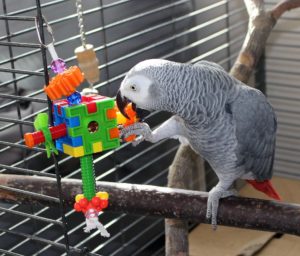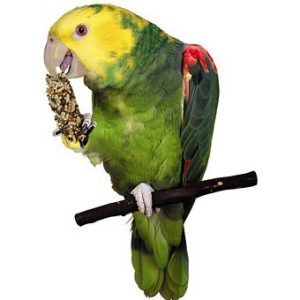 In the wild, creatures of all kinds have a level of differing intelligence that assists them in their daily existence. None of this is a surprise. It stands to reason that the ability to process thoughts, decipher problematic situations that occlude the way of necessity and the ability to get along is quite the requirement for any creature – humans included.
In the wild, creatures of all kinds have a level of differing intelligence that assists them in their daily existence. None of this is a surprise. It stands to reason that the ability to process thoughts, decipher problematic situations that occlude the way of necessity and the ability to get along is quite the requirement for any creature – humans included.
For our beloved parrots, a collection of scientific tests and published studies over the decades has uncovered just how smart these majestic exotic birds are. With each study, we find their ability to think logically and to react appropriately and favorably far outweigh our previous understanding. In short, we’re not only learning the vast depts of parrot intelligence, but in so learning, we develop a new understanding of not just birds, but other creatures as well.
The Need for Mental Stimulation
Let’s concentrate on the parrots that are in our homes rather than in the wild. What of their intelligence? Well, we already know they’re smart. But it’s important to recognize that most of the birds in our homes are typically the only one in the setting. In that, they are deprived of a hive learning process. Recently, researchers at the University of Guelph (Canada), University of Bristol (UK), and Utrecht University (Netherlands) studied large-brained parrots in homes. They determined that birds in a home setting need continued and intense stimulation to improve the mental capacity they can achieve.
Food for Thought

This new study drew on results from a 1990 study that looked at abnormal behavior in the cage – pacing, biting bars, and other concerning behaviors. That study looked at unchallenging diets, generic housing methods, and a host of other things to recognize how such creatures adjusted to a different life away from their accustomed and wild environment. It was discovered that a diet of standard seed, insects, and nuts was typically not the best diet to provide to a bird in the home or a zoo setting. Rather, more complex feeding was determined to be best. This gave the parrots a chance to spend a large amount of time foraging and working to extract their foods, a process they readily did in the wild.
Birds in homes are not the only ones impacted by this. In fact, the birds in zoo settings have as much need, if not more. The results of this new study revealed empirically that many large-brained creatures struggled mentally in caged -or closed-in settings.
To prevent our birds from becoming mentally corralled leading to adverse behavior, it’s recommended that more mental stimulation be provided. Puzzles that pique the interest of the bird, and a naturalized aviary setting can go a long way in providing the mental stimulation that your bird requires. In fact, understanding the kind of bird that you have in your home can go a long way in helping them exist in a healthy manner – both physically and mentally.
It is estimated that most exotic birds alive today are pets inside homes. This puts an extraordinary responsibility on the owner to ensure that their bird receives the proper mental and physical stimulation challenging foods, and of course, excellent health care. If your bird is exhibiting concerning behavior like feather-biting and plucking, take the time to explore what might help them to better exist in their current setting.
This new study was recently published in the Biological Sciences journal, Proceedings of the Royal Society B. The University of Bristol write-up of this study can be found here.
